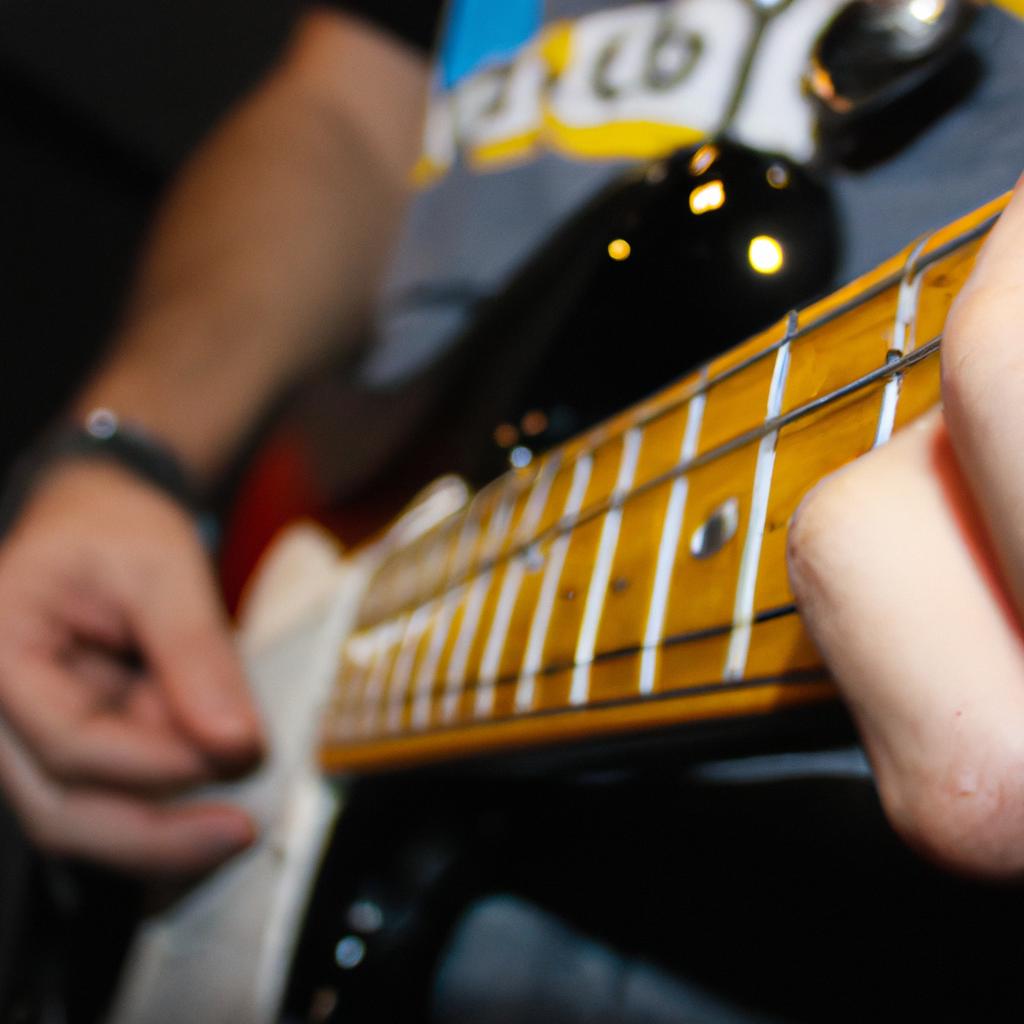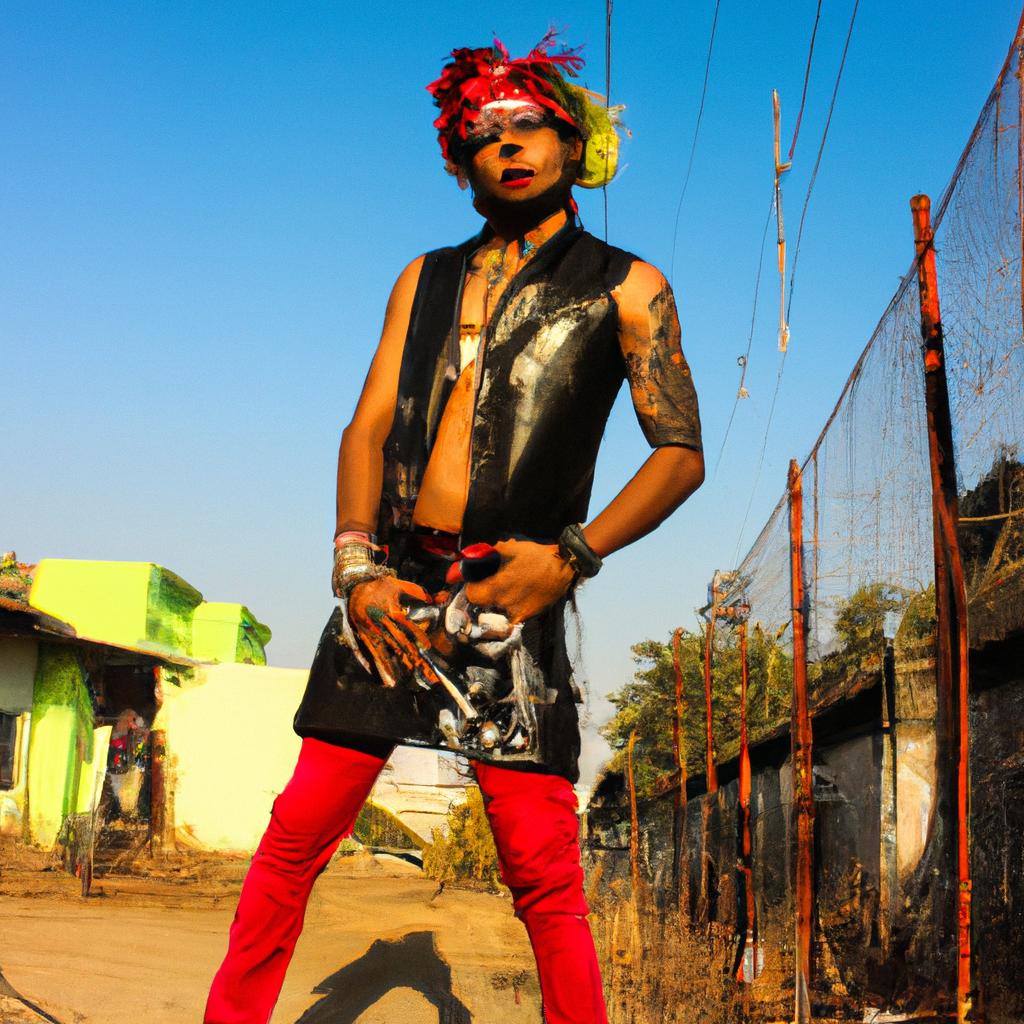Punk rock, often regarded as the sound of rebellion, emerged in the 1970s as a subgenre of rock music. With its raw and aggressive energy, punk rock has been associated with countercultural movements and anti-establishment sentiments. One example that illustrates this rebellious spirit is the rise of the Sex Pistols, a British punk band known for their provocative lyrics and confrontational stage presence. Their album “Never Mind the Bollocks, Here’s the Sex Pistols” became an emblematic piece of punk rock history, challenging societal norms and inspiring subsequent generations of musicians.
In academic circles, there has been considerable debate regarding the origins and defining characteristics of punk rock. Some scholars argue that it evolved from earlier musical genres like garage rock or protopunk bands such as The Stooges and The New York Dolls. Others suggest that punk rock was a reaction to the commercialization of mainstream music industries during that time period. Regardless of its specific lineage, what remains clear is that punk rock served as a powerful form of expression for disaffected youth who sought to challenge social conventions and voice their dissent against political authorities.
This article aims to explore the multifaceted nature of punk rock by examining its historical context, cultural impact, and musical legacy. By delving into the development of punk rock, its key figures and movements, and its lasting influence on various artistic mediums, we can gain a deeper understanding of its significance within popular culture.
One aspect worth exploring is how punk rock was not just a musical genre, but also a DIY (do-it-yourself) ethos that encouraged individualism and self-expression. Punk bands often formed their own record labels, booked their own shows, and released their music independently, bypassing traditional channels of the music industry. This self-sufficient approach empowered artists to create on their own terms and paved the way for alternative subcultures to thrive.
Furthermore, punk rock’s impact extended beyond the realms of music. Its aesthetic and fashion choices – characterized by ripped clothing, leather jackets, safety pins, and colorful hair – became synonymous with rebellion and nonconformity. The punk movement inspired visual artists, filmmakers, writers, and designers to challenge established norms in their respective fields.
Additionally, punk rock played a vital role in shaping social and political discourse. Its lyrics often tackled issues such as unemployment, inequality, racism, war, and government oppression. Bands like The Clash used their platform to address systemic injustices while advocating for unity among marginalized communities.
Lastly, it is important to acknowledge how punk rock continues to influence contemporary music scenes worldwide. From post-punk revival bands like Arctic Monkeys to pop-punk acts like Green Day or Paramore; traces of punk’s energy can be heard across genres even today.
In conclusion,{finish the paragraph}
Origins of Punk
Punk rock, known for its raw energy and unapologetic attitude, emerged in the mid-1970s as a response to the prevailing musical and social climate. One example that exemplifies this rebellion is the case of the Sex Pistols, a British punk band notorious for their provocative lyrics and confrontational performances. The origins of punk can be traced back to numerous factors, including socio-political unrest, dissatisfaction with mainstream music, and a desire for individual expression.
At its core, punk was born out of frustration with societal norms and conventions. A bullet point list encapsulates some key aspects that contributed to the emergence of punk:
- Youth disillusionment: Disenchanted by political corruption, economic hardships, and social inequality, many young people felt alienated from traditional systems.
- Musical discontent: Dissatisfaction with overproduced commercial pop music pushed individuals to seek an alternative sound that embodied authenticity and rebelliousness.
- Do-it-yourself ethos: Rejecting corporate control over artistic creation, punks embraced a self-made approach to music production and distribution.
- DIY fashion aesthetic: Punks employed unconventional styles such as ripped clothing, leather jackets adorned with studs or safety pins, colorful haircuts, and distinctive makeup to challenge societal beauty standards.
A table further illustrates how these elements converged during the rise of punk:
| Factors | Influence |
|---|---|
| Socio-political unrest | Inspired lyrical content critiquing authority figures |
| Dissatisfaction with mainstream music | Sparked innovation in sound through aggressive guitar riffs and fast-paced drumming |
| Desire for individual expression | Encouraged diverse subcultures within the broader punk movement |
Punk’s impact on society extended far beyond just being a genre of music. By defying conventional rules both musically and aesthetically, it challenged existing power structures while giving voice to marginalized individuals. The subsequent section will delve into the ways punk rock influenced and shaped society, from its impact on fashion trends to its role as a platform for social commentary.
*[Transition: Expanding beyond its musical roots, let us now explore the broader societal implications of the punk movement in greater detail.]
Punk’s Impact on Society
Punk Rock: The Sound of Rebellion
The origins of punk can be traced back to the mid-1970s in both the United States and the United Kingdom. This section will delve into how punk emerged as a response to societal issues, challenging established norms and giving voice to marginalized communities.
One notable example that epitomizes the spirit of rebellion within punk is the Sex Pistols, an English band formed in 1975. With their provocative lyrics and aggressive sound, they quickly gained notoriety for their anti-establishment stance. Their single “Anarchy in the U.K.” became an anthem for disaffected youth, expressing frustration with political corruption and social injustices. Through their music, the Sex Pistols embodied the defiance inherent in early punk rock.
To understand why punk had such a profound impact on society, it is essential to examine its core principles:
- Individualism: Punk encouraged individuals to express themselves authentically without conforming to societal expectations.
- DIY (Do It Yourself) Ethos: Punk rejected corporate control over art by promoting self-production and independent record labels.
- Anti-consumerism: Punk challenged consumer culture’s emphasis on materialism, advocating for a simpler way of life.
- Inclusivity: Punk created a space where people from diverse backgrounds could come together and find solace in shared experiences.
These principles were crucial in shaping punk’s impact beyond just music. A table below highlights some key areas where punk made waves:
| Area | Impact |
|---|---|
| Fashion | Ripped clothing, unconventional hairstyles |
| Art | Embraced new forms like graffiti and zines |
| Activism | Rallying against social inequality |
| Gender Equality | Breaking down traditional gender stereotypes |
Through these avenues, punk ignited a cultural revolution that resonated far beyond its musical roots. It challenged the status quo and inspired countless individuals to question authority, fight for their rights, and challenge societal norms.
As we delve further into examining punk’s influence on society, it is important to explore its DIY ethos in punk culture. This notion of self-sufficiency and independence fueled not only the music but also the movement as a whole.
DIY Ethos in Punk Culture
Punk Rock: The Sound of Rebellion
As the influence of punk rock spread throughout society, it became increasingly clear that this music genre was not simply a passing trend. Its impact on various aspects of culture and social norms has been profound. From challenging authority to promoting individuality, punk rock truly embodies rebellion. This section will delve into the DIY ethos within punk culture, highlighting its significance in fostering an alternative approach to creativity and self-expression.
The DIY Ethos in Punk Culture
One example that exemplifies the DIY ethos within punk culture is the formation of independent record labels by bands themselves. Rather than relying on major record companies, punk bands took matters into their own hands, releasing records through small, self-funded labels. This allowed them to maintain creative control over their work and resist corporate influence. For instance, Dischord Records founded by Ian MacKaye from Minor Threat stands as a testament to the spirit of independence and self-sufficiency that defined punk rock.
To further understand the importance of the DIY ethos in punk culture, let us examine some key elements associated with this movement:
- Self-production: Punk musicians frequently recorded their own albums or distributed homemade tapes.
- Handmade aesthetics: Album covers often featured unique artwork created by band members or local artists.
- Zines and flyers: These self-published magazines and promotional materials served as crucial communication tools for sharing information about upcoming shows and spreading counter-cultural ideas.
- Alternative venues: Instead of relying solely on traditional concert halls or clubs, punks organized gigs in unconventional spaces such as basements, squats, or abandoned buildings.
| Elements | Description |
|---|---|
| Self-production | Punk musicians recording albums independently |
| Handmade aesthetics | Unique artwork on album covers |
| Zines and flyers | Self-published magazines for promotion |
| Alternative venues | Unconventional spaces for gigs |
This DIY approach fostered a strong sense of community and empowerment within the punk scene. By taking control of their own destiny, punks defied mainstream expectations and created an environment that valued individualism and self-expression above all else.
The DIY ethos in punk culture not only influenced how music was produced but also had a profound impact on fashion and style. As we explore this next aspect, it becomes evident that punk rock’s rebellion extended beyond just its sound.
Punk Fashion and Style
Having explored the DIY ethos that characterizes punk culture, it is now imperative to delve into the iconic fashion and style associated with this rebellious movement. Punk rock’s distinctive aesthetic has been instrumental in shaping its identity and fostering a sense of unity among its followers.
Punk fashion goes beyond mere clothing choices; it is an expression of defiance against societal norms and expectations. One can imagine a hypothetical scenario where someone dons ripped jeans, leather jackets adorned with safety pins, and combat boots as they attend a punk concert. This individual’s outfit serves as a visual representation of their rejection of mainstream conventions and alignment with punk ideology.
- Vivid hair colors such as neon green or vibrant pink act as statements challenging conventional beauty standards.
- Accessories like spiked collars, studded belts, and wristbands add an element of edginess while symbolizing resistance.
- Band t-shirts featuring provocative artwork allow wearers to show allegiance to specific bands or express support for countercultural movements.
- Distinctive makeup styles involving heavy eyeliner or facial piercings can be seen as acts of self-expression, highlighting nonconformity.
A closer examination reveals the multifaceted nature of punk fashion through the lens of a three-column table:
| Element | Purpose | Emotion Evoked |
|---|---|---|
| Ripped Clothing | Symbolic rebellion | Discontent |
| Safety Pins | Signify solidarity | Defiance |
| Combat Boots | Display strength | Empowerment |
| Leather Jackets | Promote toughness | Unapologetic attitude |
In conclusion, punk fashion plays a vital role in conveying messages rooted in rebellion and social critique. Through unique attire choices and distinct aesthetics, punk rock enthusiasts challenge societal norms and embrace an identity that goes against the grain. As we transition into exploring political messages in punk lyrics, it becomes evident how fashion and style serve as visual representations of a broader movement seeking to provoke change.
Building upon the examination of punk fashion and style, it is essential to explore another significant aspect of punk culture — its powerful political messages conveyed through music and lyrics.
Political Messages in Punk Lyrics
Building upon the distinctive fashion and style of punk rock, its lyrics serve as powerful conduits for political messages. Punk music is known for its raw energy, aggressive sound, and rebellious spirit; however, it also embodies a profound social commentary that challenges societal norms. Through their lyrics, punk bands express dissent, advocate for change, and shed light on pressing issues. This section delves into the political messages embedded within punk lyrics.
Punk musicians have long utilized their platform to address various socio-political concerns. For instance, let us consider the iconic band Dead Kennedys’ song “Holiday in Cambodia.” Released in 1980 during a time when Cambodia was under oppressive rule by Pol Pot’s Khmer Rouge regime, this track serves as a scathing critique of American ignorance towards international atrocities. The song’s biting sarcasm highlights the hypocrisy of Western privilege while shedding light on the horrors faced by Cambodian citizens.
The political messages conveyed through punk lyrics can be categorized into several key themes:
- Anti-establishment: Punk music often rebels against traditional authority structures such as government institutions or corporate powerhouses.
- Social justice: Many punk songs tackle issues related to inequality, discrimination, and marginalized communities.
- War and militarism: Lyrics frequently denounce war and criticize military aggression.
- Environmental activism: Some punk bands use their music to raise awareness about ecological destruction and climate change.
- Empowering individuals to challenge existing power dynamics
- Amplifying voices of marginalized groups
- Inspiring rebellion against injustice
- Fostering a sense of community among listeners
Table – Political Messages in Punk Lyrics:
| Theme | Example Song |
|---|---|
| Anti-establishment | “Anarchy in the U.K.” |
| Social justice | “White Riot” |
| War and militarism | “War Pigs” |
| Environmental activism | “Earth Song” |
Punk music continues to be a catalyst for social change, with its lyrics serving as poignant expressions of dissent and resistance. By using their platform to shed light on pressing issues, punk bands have been able to inspire generations of activists and individuals seeking societal transformation. As we explore the evolution and legacy of punk rock in the subsequent section, it becomes evident that this genre’s political messages continue to resonate with audiences worldwide.
Moving beyond the exploration of political messages within punk lyrics, let us now delve into the evolution and legacy of punk rock.
Evolution and Legacy of Punk Rock
Transitioning from the previous section on political messages in punk lyrics, it is evident that punk rock as a genre has had a profound impact on music history. Beyond its rebellious nature and politically charged lyrics, punk rock played a crucial role in shaping the evolution of popular music and leaving an enduring legacy. This section will explore the key milestones and lasting influence of punk rock.
One notable example of how punk rock transformed the music landscape can be seen in the rise of alternative rock in the 1990s. Bands like Nirvana, Pearl Jam, and Soundgarden emerged with their raw sound influenced by punk’s DIY ethos. These artists gained mainstream success while maintaining some level of countercultural authenticity, proving that punk’s spirit could permeate different genres.
To further understand the ongoing significance of punk rock, we can examine its lasting legacy through a list:
- Inspiring countless musicians to challenge conventional norms and express themselves authentically.
- Fostering communities where marginalized voices were amplified.
- Contributing to the development of subcultures such as goth, emo, and hardcore.
- Influencing fashion trends with iconic styles like leather jackets, band t-shirts, and dyed hair.
Additionally, examining the broader impact of punk allows us to appreciate its far-reaching effects. The following table highlights influential bands across different eras within the vast spectrum of punk rock:
| Era | Band | Notable Contribution |
|---|---|---|
| 1970s | Sex Pistols | Ignited global interest in rebellion against authority |
| 1980s | Dead Kennedys | Merged politics with aggressive musicality |
| 1990s | Green Day | Brought pop-punk into the mainstream |
| 2000s-today | Against Me! | Advocated for transgender rights through music |
In conclusion, the evolution and legacy of punk rock have left an indelible mark on popular culture. From its influence on alternative rock to the creation of various subcultures, punk’s impact extends far beyond its initial rebellious nature. By inspiring musicians, empowering marginalized voices, and shaping fashion trends, punk continues to resonate with audiences around the world. It remains a testament to the power of artistic expression as a catalyst for change.




